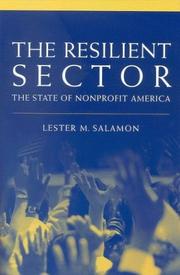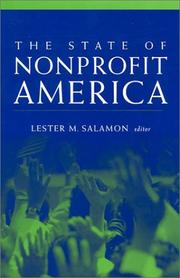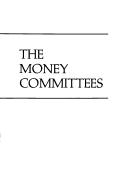| Listing 1 - 10 of 52 | << page >> |
Sort by
|

ISBN: 0815776799 0815796099 Year: 2003 Publisher: Washington, D.C. Brookings Institution
Abstract | Keywords | Export | Availability | Bookmark
 Loading...
Loading...Choose an application
- Reference Manager
- EndNote
- RefWorks (Direct export to RefWorks)
The Resilient Sector makes available in an updated form the concise overview of the state of health of America's nonprofit organizations that Johns Hopkins scholar Lester Salamon recently completed as part of the "state of nonprofit America" project he undertook in cooperation with the Aspen Institute. Contrary to popular understanding, Salamon argues, America's nonprofit organizations have shown remarkable resilience in recent years in the face of a variety of difficult challenges, significantly re-engineering themselves in the process. But this very resilience now poses risks for the sector's continued ability to perform the tasks that we have long expected of it. The Resilient Sector offers nonprofit practitioners, policymakers, the press, and the public at large a lively assessment of this set of institutions that we have long taken for granted, but that the Frenchman Alexis de-Toqueville recognized to be "more deserving of our attention" than almost any other part of the American experiment.
Firms and enterprises --- United States --- Nonprofit organizations --- -#SBIB:034.IOS --- #SBIB:35H6030 --- #SBIB:35H300 --- Corporations, Nonprofit --- Non-profit organizations --- Non-profit sector --- Non-profits --- Nonprofit sector --- Nonprofits --- Not-for-profit organizations --- NPOs --- Organizations, Nonprofit --- Tax-exempt organizations --- Associations, institutions, etc. --- Bestuur en beleid: nationale en regionale studies: Verenigde Staten --- Organisatieleer: algemene werken --- #SBIB:034.IOS --- United States of America

ISBN: 0801849632 9780801849633 Year: 1995 Publisher: Baltimore (Md.): Johns Hopkins University press,
Abstract | Keywords | Export | Availability | Bookmark
 Loading...
Loading...Choose an application
- Reference Manager
- EndNote
- RefWorks (Direct export to RefWorks)
Nonprofit organizations --- Social service --- Government policy --- #SBIB:35H201 --- #SBIB:35H437 --- #SBIB:316.8H40 --- #SBIB:021.IO --- Overheidsmanagement: technieken --- Beleidssectoren: sociale zekerheid --- Sociaal beleid: social policy, sociale zekerheid, verzorgingsstaat --- Non-profitorganisaties --- Sociaal beleid:Verenigde Staten --- Non-profitorganisaties. --- Sociaal beleid:Verenigde Staten. --- Corporations, Nonprofit --- Non-profit organizations --- Non-profit sector --- Non-profits --- Nonprofit sector --- Nonprofits --- Not-for-profit organizations --- NPOs --- Organizations, Nonprofit --- Tax-exempt organizations --- Associations, institutions, etc. --- Benevolent institutions --- Philanthropy --- Relief stations (for the poor) --- Social service agencies --- Social welfare --- Social work --- Human services --- United States --- Social policy --- 1980-1993 --- Corporations [Nonprofit ] --- Nonprofit organizations - United States. --- Social service - Government policy - United States.

ISBN: 0195136659 9780195136654 0199770867 0199881278 Year: 2002 Publisher: Oxford : Oxford University Press,
Abstract | Keywords | Export | Availability | Bookmark
 Loading...
Loading...Choose an application
- Reference Manager
- EndNote
- RefWorks (Direct export to RefWorks)
The Tools of Government is the first professional guide to the principles and practices of public administration in an age when governments no longer provide many services--but arrange for others to do so. Characterized by extensive collaboration among levels of government and between government and the private sector, this new approach to solving public problems presents many new important issues. Comprehensive in scope, this new book offers a first hand look at the challenges faced by contracting out to nonprofit and profit sectors for grants, insurance, regulation, vouchers, cooperative arrangements, tax data, grants-in-aid, and others. The chapters examine over 20 different tools in use today and summarizes their basic features, patterns of usage, key tasks, political and substantive rational, and the major management challenges that each one poses. International in coverage and application, this book is ideal for students, teachers, and scholars in public administration, management, public policy, economics, political science, and nonprofit management; managers and heads of state, local, and federal agencies; executives in foundations and other nonprofit organizations; and academic, government, and research libraries.
Political planning. --- Public administration. --- Intergovernmental cooperation. --- Public-private sector cooperation. --- Contracting out. --- Politique publique --- Administration publique (Science) --- Coopération intergouvernementale --- Partenariat public-privé --- Impartition --- Political planning --- Public administration --- Intergovernmental cooperation --- Public-private sector cooperation --- Contracting out --- #SBIB:35H42 --- #SBIB:35H410 --- Contract services --- Contracting for services --- Outsourcing --- Services, Contracting for --- Letting of contracts --- Privatization --- Public contracts --- Private-public partnerships --- Private-public sector cooperation --- Public-private partnerships --- Public-private sector collaboration --- Cooperation --- Cooperative government arrangements --- Interagency coordination --- Administration, Public --- Delivery of government services --- Government services, Delivery of --- Public management --- Public sector management --- Political science --- Administrative law --- Decentralization in government --- Local government --- Public officers --- Planning in politics --- Public policy --- Planning --- Policy sciences --- Politics, Practical --- Beleidsinstrumenten --- Beleidscyclus: algemene werken --- Bestuurskunde --- Overheidsmanagement --- Bestuurskunde. --- Overheidsmanagement. --- Coopération intergouvernementale --- Partenariat public-privé --- United States --- Politics and government

ISBN: 0815706243 0815706235 0815706499 Year: 2003 Publisher: Washington, D.C. Brookings Institution
Abstract | Keywords | Export | Availability | Bookmark
 Loading...
Loading...Choose an application
- Reference Manager
- EndNote
- RefWorks (Direct export to RefWorks)
A Brookings Institution Press and the Aspen Institute publication The thousands of organizations that comprise America's private nonprofit sector represent a national treasure. Yet serious pressures are altering the playing field on which nonprofits operate, and many are responding in ways that may undermine their popular support. Despite the significance of these developments, little has been done to analyze and interpret them in a clear and understandable way. Lester M. Salamon, a leading authority on the nonprofit sector, has joined forces with more than a dozen other experts and the Aspen Institute to produce this volume, an integrated, authoritative assessment of the state of nonprofit America and the key trends affecting its evolution. The book is organized into three sections. The first summarizes critical trends and issues; the second examines each of the sector's major subsectors (e.g., health, education, social services, arts and culture, international assistance, advocacy); the third focuses on major cross-cutting trends and issues (commercialization, changing government policy, accountability, and demographic and technological imperatives). The Resilient Sector will be updated every two years. It provides a basic sourcebook for sector leaders, the press, public officials, and citizens concerned about the future of America's nonprofit sector and eager to understand the forces affecting it.
Sociology of organization --- Firms and enterprises --- United States --- Nonprofit organizations --- #SBIB:031.IO --- #SBIB:35H300 --- #SBIB:35H6030 --- Corporations, Nonprofit --- Non-profit organizations --- Non-profit sector --- Non-profits --- Nonprofit sector --- Nonprofits --- Not-for-profit organizations --- NPOs --- Organizations, Nonprofit --- Tax-exempt organizations --- Associations, institutions, etc. --- Organisatieleer: algemene werken --- Bestuur en beleid: nationale en regionale studies: Verenigde Staten --- Enseignement --- Teaching --- Bénévolat --- Capitalisme --- États-Unis --- Culture --- Eglise --- Nonprofit --- Santé --- United States of America --- Bénévolat --- Santé --- États-Unis
Book
ISBN: 0199381429 0199357552 9780199357550 Year: 2014 Publisher: New York : Oxford University Press,
Abstract | Keywords | Export | Availability | Bookmark
 Loading...
Loading...Choose an application
- Reference Manager
- EndNote
- RefWorks (Direct export to RefWorks)
The resources of both governments and traditional philanthropy are either barely growing or in decline, yet the problems of poverty, ill-health, and environmental degradation balloon daily. It is therefore increasingly clear that we urgently need new models for financing and promoting social and environmental objectives. Fortunately, a significant revolution appears to be underway on the frontiers of philanthropy and social investing, tapping not only philanthropy, but also private investment capital, and providing at least a partial response to this dilemma. This book examines the new actors
Charities. --- Investments --- Moral and ethical aspects. --- Charities --- Moral and ethical aspects --- E-books --- Corporate social investment --- Ethical investments --- Investments, Ethical --- Investments, Socially responsible --- Social investing --- Socially responsible investments --- Alms and almsgiving --- Benevolent institutions --- Charitable institutions --- Endowed charities --- Institutions, Charitable and philanthropic --- Philanthropy --- Poor relief --- Private nonprofit social work --- Relief (Aid) --- Social welfare --- Associations, institutions, etc. --- Poor --- Social service --- Endowments --- Societies, etc. --- Services for
Book
ISBN: 9780199377633 9780199376544 0199376549 0199377634 0199392587 9780199392582 9780199376520 0199376522 9780199376537 0199376530 Year: 2014 Publisher: New York : Oxford University Press,
Abstract | Keywords | Export | Availability | Bookmark
 Loading...
Loading...Choose an application
- Reference Manager
- EndNote
- RefWorks (Direct export to RefWorks)
This volume presents a comprehensive and authoritative account of the new actors and tools revolutionizing global philanthropy and social investment at the present time. At a time of declining government resources and limited charitable capability, this development represents one of the most hopeful signs for gaining meaningful traction on the globe's escalating problems of poverty.
Endowments --- Charities --- Social service --- Social Welfare & Social Work --- Social Sciences --- Social Welfare & Social Work - General --- Benevolent institutions --- Philanthropy --- Relief stations (for the poor) --- Social service agencies --- Social welfare --- Social work --- Human services --- Alms and almsgiving --- Charitable institutions --- Endowed charities --- Institutions, Charitable and philanthropic --- Poor relief --- Private nonprofit social work --- Relief (Aid) --- Associations, institutions, etc. --- Poor --- Charitable foundations --- Charitable trusts --- Donations --- Educational endowments --- Foundations (Endowments) --- Private foundations --- School endowments --- Education and state --- Societies, etc. --- Services for --- Charities. --- Endowments. --- Social service.
Book
ISBN: 1565494032 9781565494039 9781565493131 1565493133 9781565493148 1565493141 Year: 2010 Publisher: Sterling, VA : Kumarian Press,
Abstract | Keywords | Export | Availability | Bookmark
 Loading...
Loading...Choose an application
- Reference Manager
- EndNote
- RefWorks (Direct export to RefWorks)
In 1961, President John F. Kennedy outlined a bold new policy of reform toward Latin America which gave commitments to work with Latin American governments to promote more progressive tax structures, institute meaningful land reform, democratize governments, strengthen civic organizations, and significantly reduce poverty. This "Alliance for Progress" was disbanded within 12 years however, as political situations in both the US and Latin America shifted.Three decades later, in 1995, NGOs and private businesses began partnering up for a new alliance for progress. Unlike Kennedy's policy, private enterprise rather than government was now seen as a solution to many of the region's problems. Corporate social engagement (CSE) became and remains a buzzword. Salamon, one of the foremost experts on civil society, examines what forms this new movement is taking and how it's implemented, why businesses are choosing to participate, variations between countries in their approach to such partnerships, and whether CSE has made any positive impact. Brief and highly readable, the book offers a constructive critique of CSE and shows how civil society can exert positive and constructive influence on business practices.
Social responsibility of business --- Business --- Corporate accountability --- Corporate responsibility --- Corporate social responsibility --- Corporations --- CSR (Corporate social responsibility) --- Industries --- Social responsibility, Corporate --- Social responsibility of industry --- Business ethics --- Issues management --- Social responsibility --- Social aspects --- Amérique latine --- Nonprofit --- Participation

ISBN: 0670485268 9780670485260 Year: 1975 Publisher: New York (N.Y.): Grossman,
Abstract | Keywords | Export | Availability | Bookmark
 Loading...
Loading...Choose an application
- Reference Manager
- EndNote
- RefWorks (Direct export to RefWorks)
Book
ISBN: 9780815703303 Year: 2012 Publisher: Washington, D.C. Brookings Institution
Abstract | Keywords | Export | Availability | Bookmark
 Loading...
Loading...Choose an application
- Reference Manager
- EndNote
- RefWorks (Direct export to RefWorks)
Sociology of organization --- Firms and enterprises --- United States of America

ISBN: 0030456010 Year: 1978 Publisher: New York
Abstract | Keywords | Export | Availability | Bookmark
 Loading...
Loading...Choose an application
- Reference Manager
- EndNote
- RefWorks (Direct export to RefWorks)
| Listing 1 - 10 of 52 | << page >> |
Sort by
|

 Search
Search Feedback
Feedback About UniCat
About UniCat  Help
Help News
News